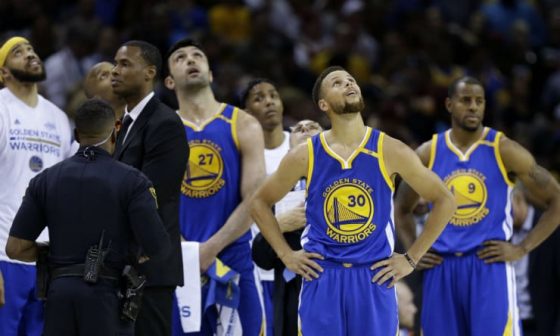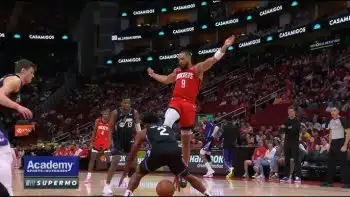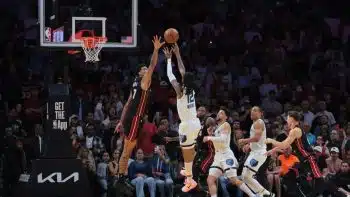NBA
NBA Finals: Inside The Numbers

With the Golden State Warriors on the verge of a dynasty and the Cleveland Cavaliers facing a second win-or-go-home scenario in tonight’s NBA Finals Game 5 at Oracle Arena, Basketball Insiders takes a look at some of the statistical anomalies that have emerged during the series. A win for the Warriors would mean a second NBA championship in three seasons while a Cavaliers victory would make things very interesting heading into a potential series-tying Game 6 in Cleveland. Following are some of the key numbers that tell the story of the series.
LeBron James: Going It Alone
Cavaliers starters Kevin Love, J.R. Smith, Tristan Thompson and Kyrie Irving are all in the bottom five in aggregate plus-minus for the series. Shaun Livingston (-18) is the only Warrior with a total plus-minus worse than Love’s -12. This means LeBron James, with a team-high +6, hasn’t had much help from the other four Cavaliers with at least 100 minutes in the series. James once dragged a team that started Daniel “Boobie” Gibson and Sasha Pavlovic to an NBA Finals. But if he doesn’t start getting more help from his teammates, James may have carried this team as far as he can. Cleveland is scoring 116.6 points per 100 possessions with James on the court, but only 66.9 per 100 in the 26 minutes he’s spent on the bench for the series.
Kevin Durant: Defensive Liability
The Warriors are allowing 114 per 100 possessions with Kevin Durant on the court in the Finals, but only 88 per 100 when he’s on the bench. It’s a microscopic 34-minute off-court sample (no other Warrior has spent less time on the bench in the series), but the individual tracking numbers confirm Durant hasn’t been great on the defensive end. Opponents are shooting over 58 percent within six feet of the basket when guarded by Durant and 22-for-43 (51 percent) overall on two-pointers.
Kyle Korver: Defensive Stopper
The common narrative about Kyle Korver is that he helps you offensively but he’s a defensive liability due to his age (36) and foot speed. In these Finals, the opposite has been the case. Korver is shooting just 4-for-14 (28.6 percent) from three in the Finals. Cleveland is scoring a team-low 97.2 points per 100 with Korver on the court, which is nearly 10 points worse than his closest teammate (Love, 106.9 offensive rating). But somehow the Warriors are only scoring 99.3 per 100 with Korver on the court, a team-best defensive rating. When Korver is on the bench, Golden State scores 126.8 per 100, meaning the Cavaliers are 27.5 points per 100 worse defensively with Korver on the bench than on the court.
This may be a statistical quirk from a four-game sample, but Korver’s individual defensive tracking numbers back up the idea that Golden State hasn’t been able to take advantage of his defense. Opposing players have shot just 33 percent in the series when guarded by Korver, including just 1-for-13 on three-pointers.
Andre Iguodala: MVP
The Warriors have performed better on a per-minute basis with Andre Iguodala on the court than any other player, and it’s not close. Iguodala’s +16.7 net rating is a series-best and it’s 7.5 points per 100 possessions better than Thompson and Curry, who are tied for second at +9.2. Iguodala has scored only 23 points for the series — sixth on the team — so obviously calling him MVP is hyperbole. But the Warriors are more than 11 points per 100 better offensively and defensively with Iguodala on the court compared to when he’s on the bench. By comparison, Golden State has struggled defensively with Curry on the court and offensively with Thompson on the court.
Iman Shumpert: Impact Player
In a limited 63-minute sample, the Cavaliers are +3.2 per 100 possessions with Iman Shumpert on the court, a team-best net rating. As with Iguodala, Cleveland is better both offensively and defensively with Shumpert on the court compared to when he’s on the bench. While Shumpert’s 18 points for the series are seventh on the team and his 25 percent field goal shooting is the worst of any Cavalier with at least 50 minutes, he’s holding opposing shooters under 35 percent for the series, including under 22 percent on three-pointers.
Tristan Thompson: Getting Torched From Deep
The Cavaliers are allowing a series-worst 126.5 points per 100 with Thompson on the court compared to a mere 102.2 off the court in a nearly-identical minutes sample. The Warriors have been able to take advantage of Thompson on switches, shooting 10-for-19 (nearly 53 percent) on three-pointers he guards. Thompson’s series-worst defensive rating and series-worst net rating (-12.9) are further evidence of the demise of the traditional big man in the modern NBA. Thompson’s 25.6 minutes per game are the most for any traditional post player in the series, and the Cavaliers have performed worse in Thompson’s minutes than any other player.
These are just a few of the interesting statistical anomalies that have emerged during the NBA Finals. With only a four-game sample, these numbers are by no means predictive of what will happen in tonight’s Game 5 or for the rest of the series if Cleveland is able to extend it. But the stats above should be interesting to track to see if the eye test conforms to what the numbers are saying about the NBA Finals.











